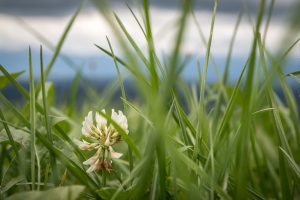A native of Europe and Central Asia, White Clover is a herbaceous perennial legume that is now used the world over in forage production.
A plant that prefers a more temperate climate, White Clover is well suited to the cool, moist conditions of our neighbour New Zealand, where it can be found nationwide. In Australia, however, it is confined to our more temperate areas that experience medium to high rainfall.
Nonetheless, it is a fantastic choice of grass for anyone with livestock to feed. Let’s have a look at some of the pros and cons of choosing White Clover for your pasture.
Pros
The main positive associated with White Clover is its excellent forage production. Given the right conditions, White Clover will thrive. Growing at its peak, White Clover will be able to withstand heavy grazing, and grow back very quickly. It boasts a very high feed value, which is great for hungry livestock.
As well as producing a lot of forage in its own right, White Clover also spurs on any companion grasses that are planted with it. White Clover has the ability to produce and fix atmospheric nitrogen, assisting the growth of any companion grasses nearby.
This also means that White Clover can be used as what’s called a “living mulch”, planted between vegetable or fruit plants in order to assist in their growth as well. The plant does very well in shaded, moist conditions, and the dense root system will mean that your living mulch will also choke out most weeds that look to enter your veggie patch.
Having evolved to suit temperate conditions, White Clover does well in the cold, and can handle a brisk winter. Its resistance to frosts is perfect for those in Australia’s southern reaches.
White clover is also a hardy plant, and will grow in infertile soils where other pastures might struggle. If the soil that you plant it in is of an average quality, while White Clover may well cope just fine without assistance, a dose of phosphorous can help in getting the plant performing the best that it can.
Another perk for the plants that find themselves planted with White Clover is that it is also a great attractor of bees. If you have flowering plants that require pollination from bees, utilising White Clover nearby will have those helpful bees heading your way.
Cons
While it may be able to make it through a short dry spell, in reality White Clover is relatively intolerant to drought. Particularly when we talk about Australian conditions, where much of our nation’s more temperate regions experience quite a dry summer, you may need to think about irrigation as a way to keep your White Clover happy and healthy all year round.
The susceptibility to dry conditions goes hand-in-hand with a susceptibility to heat. White Clover will brown off if the mercury gets too high, even if it is well irrigated. This is where a companion grass can come in handy, as it may be able to cover for the White Clover over the summer months, allowing it to slip into dormancy during the worst of the heat, before bouncing back in autumn.
While it is certainly resilient to soils of low fertility, White Clover can be fussy to the acidity or alkalinity of the soil that it finds itself in. Its ideal pH level is between 5.8 and 7, so any soil that falls outside of that range may have White Clover not performing at its peak. If you’ve got a particularly alkaline soil, you may either have to try to alter its pH, or choose a different variety to plant.
Finally, White Clover’s love of shaded, moist conditions can sometimes be its downfall, as it is a little susceptible to diseases such as root rot. A preventative fungicide may be worth thinking about if your soil is particularly waterlogged.
All things considered, White Clover is an excellent feed option for temperate regions of Australia. If you have any queries on whether it’s the right choice for your situation, contact the friendly seed specialists at McKays.


